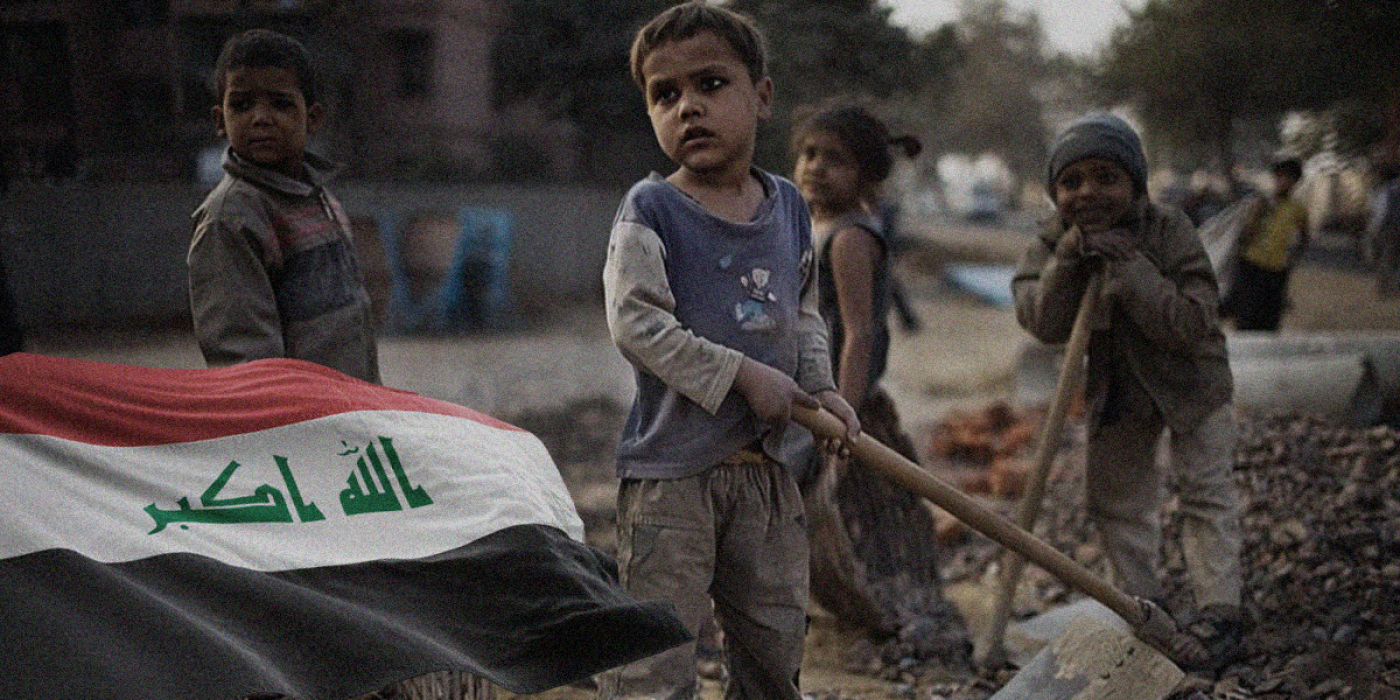Dressed in warm layers and sporting a cap to ward off the chill, Safaa, a fourteen-year-old, can be found each morning at a bustling vegetable stand in a vibrant market in eastern Baghdad. His daily routine involves assisting his mother, who tirelessly works to support the family and meet the medical expenses of his disabled father.
The scene unfolds like a poignant scene from a film, a child, not yet of legal age, laboring to support his family while his peers are seated in classroom desks.
Safaa never stepped foot into a classroom; instead, he ventured into the workforce at an early age. Every morning, before dawn breaks, Safaa's mother rises and makes her way to the vegetable market with her son, setting up their stall as the day begins.
"Our survival hinges on this spot," Safaa's mother told The New Region. "We do not receive any form of welfare ... we have applied repeatedly, yet we have not seen any outcomes."
"My husband is disabled, battling heart disease and diabetes, and the majority of our earnings are allocated to his medical care," she said with the sadness apparent on her face, commending Safaa's indispensable support. "Safaa is my lifeline, without him, I would struggle to handle work on my own."
Safaa's mother acknowledged her inability to enroll him in school and have him join his peers, stressing that the issue is not primarily financial but rather her necessity for her son's presence by her side at work.
Sadaa is an only son and his mom holds hope for a different future for him, away from their current struggles.
"I worry a lot about my son, and I do not know who will look after him once his father and I are gone,” she said.
She expressed her longing for better circumstances, wishing for a social care allowance that would enable her to send Safaa to school, even if it is just to learn basic reading and writing skills, as she articulates it.
Child labor encompasses children undertaking tasks inappropriate for their age, typically stemming from poverty and lack of resources. These roles might involve paid or unpaid work, offering minimal support for their well-being and development.
Child labor frequently exposes young children to peril, impacting their physical, mental, and social growth. They can be seen in street markets, industrial zones, and scavenging in garbage dumps, heightening the health hazards they encounter.
The New Region tried to contact Colonel Aziz Nasser, the spokesperson for the Iraqi Child Welfare Authority, seeking statistics on the influx of children into the workforce and the exodus from schools. However, despite our efforts, we did not receive a response.
Zeina al-Qaraghouli, Iraq's Ambassador for Children, highlighted the absence of official statistics regarding the number of children facing service inadequacies in Iraq. She noted that the delay in gathering statistics stems from unclear circumstances.
"Iraqi children endure a shortage of services, particularly in healthcare, given the absence of health insurance," al-Qaraghouli told The New Region. "The state of public education falls short of expectations, lacking in student-centric focus, leading to a surge in begging and student attrition."
In mid-January 2024, UNICEF disclosed that over a million Iraqi children require humanitarian aid.
According to a report by the organization, "there are roughly 2.5 million individuals in Iraq, with 1.1 million being children, and disabled individuals comprising 5.6 percent, all still reliant on humanitarian assistance."
Al-Qaraghouli asserted that it is the government's responsibility to identify homeless children, whether they are begging or abducted from their families, and to reintegrate them into the education system. She highlighted that the phenomenon of begging falls under child labor, which contravenes the Convention on the Rights of the Child signed by Iraq in 1994.
Civil society organizations provide support to the government, and there is a shared responsibility within the community itself. Ghouli emphasized that every citizen should report any unusual cases involving children.
The laws set by the Ministry of Labor and Social Affairs in Iraq include penalties for individuals employing children.
These penalties range from "financial fines to the suspension of the employer's work permit," and in some cases, the suspension of the entire activity.
Additionally, under the law on human trafficking, individuals exploiting those who are unaware of their rights, such as children, face imprisonment or fines.
Fadel al-Gharawi, head of the Strategic Center for Human Rights in Iraq, estimates that there are more than 2.5 million children in urgent need of humanitarian assistance, education, and comprehensive protection.
"Over the past three years, the prevalence of child labor has been on the rise in Iraq," Gharawi told The New Region. "This trend carries numerous adverse effects, as children are often subjected to harsh conditions in the labor market, sometimes even experiencing forms of abuse."
"Numerous children have had their childhoods stripped away, compelled to endure harsh conditions unfit for their age," he said. "Many of them toil tirelessly from dawn till dusk, akin to machines, without respite. This takes a considerable toll on their well-being.”
The head of the Strategic Center for Human Rights also highlighted that the designated ages for children in the labor market fall "between 8 and 15 years old," underscoring that "this is a crucial demographic requiring attention, as these age brackets do not conform to the Convention on the Rights of the Child or to the Iraqi Constitution, which stipulates that childhood extends until the age of eighteen."
Gharawi characterized violations against children in the labor market as "extended hours stretching from dawn till dusk, where they put in considerable effort for paltry wages that hardly reflect the value of their work. Additionally, many endure instances of bullying and mockery."
"The government must urgently implement a comprehensive national strategy for children's rights," stressed the human rights expert, advocating for "corrective actions within punitive laws to curb child labor, the establishment of rehabilitation programs and income-generating projects, and expediting the enactment of child protection laws."
Gharawi further highlighted that "economic factors, unemployment, orphanhood, the lack of breadwinners, coupled with the demands of life without support, along with the presence of displaced individuals, have compelled children to enter the labor market and work to fulfill their needs."
Meanwhile, Hanaa Hamou, the head of the Popular Aid Organization, underscored that childhood in Iraq faces numerous challenges, and efforts to secure a better and more equitable future for children remain incomplete.
Many children, along with their families, struggle below the poverty line, with a considerable dropout rate from schools, a significant portion engaged in child labor, overcrowded schools, child marriages, and children lacking legal documentation.
In an interview with The New Region, Hamou presented several key points that she deems essential for safeguarding children.
”There is an urgent need to enforce the compulsory education law to guarantee children's access to schooling, enact legislation for child protection, and implement the tenets of the national policy for child protection in Iraq,” she said.
She also stressed the importance of passing legislation to combat domestic violence, enforcing criminal laws, prosecuting those who commit crimes against children, improving services and facilities for children with disabilities and special needs, assisting their families or caregivers, and facilitating the legal documentation process for children from families associated with ISIS.
According to the head of the Popular Aid Organization, the challenges confronting the government include issues such as political will, infrastructure limitations, legislative shortcomings, and a lack of qualified personnel to cater to the needs of individuals with disabilities.
Hamou contended that it is not the child's duty to shoulder the family's economic strain or endure violence, asserting that the government should take measures to decrease the child dropout rate, discourage their entry into the labor market, and prevent them from undertaking low-paying or demeaning jobs.
She underscored that leaving school significantly alters children's life paths and exacerbates the divide between them and their peers. As a result, the likelihood of violence may rise, and these out-of-school children could become susceptible to legal or employment exploitation, potentially forfeiting their rights due to lack of literacy or digital skills.



 Facebook
Facebook
 LinkedIn
LinkedIn
 Telegram
Telegram
 X
X


